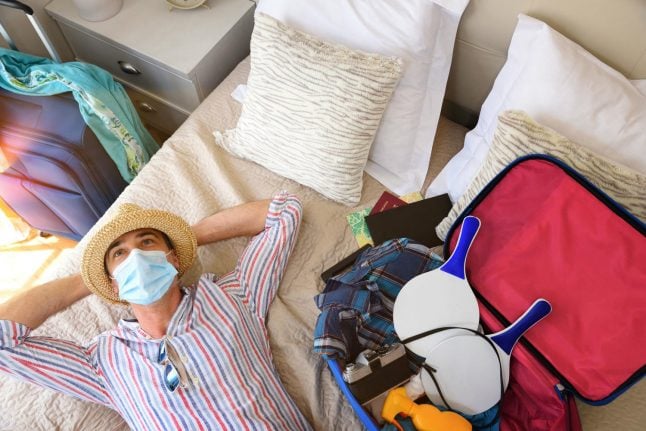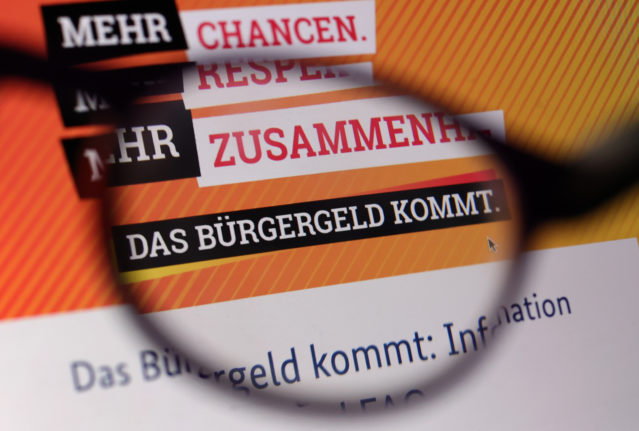When Chris, 35, from the UK travelled from Berlin to Barcelona in Spain for work at the end of August, he admits he felt guilty.
“But I had to do it for work,” said the entertainer whose gigs fell through when the pandemic hit in March.
After getting the opportunity to perform at a bar in Barcelona – classed as a high risk zone in Germany due to an increasing number of coronavirus infections – he took it, but was cautious about travel.
“I stayed at a friend's place – he was somewhere else so I had the place to myself,” he said. I didn't really walk about in Barcelona, I tried to keep myself to myself.”
Chris, along with other travellers returning to Germany from high risk areas, are asked to either quarantine for 14 days or show proof of a negative coronavirus test result.
READ ALSO: What you need to know about Germany's quarantine rules for arrivals
Before he left Berlin, Chris filled out a form online which asked questions like where he was staying and if he had any Covid symptoms.
“When you filled that out on the app you got a QR code that had to be scanned at the other side, at Barcelona,” he said. “Over and above, you got a hard copy of this form on the plane that asked the same questions.”
He spent a week in Barcelona and when he returned to Berlin, the first thing he had to do was go to a test centre at the airport.
“As soon as I landed at Schönefeld (airport) they had the test centre there which was super easy, it was clearly signposted,” he said.
READ ALSO: Explained – How Germany plans to step up measures to control coronavirus spread
The QR code was scanned again. “The German Red Cross are there waiting for you,” Chris said. He only had to wait in line a few minutes and was then met with rows of desk and German army staff.
“They scan your code, print out a sheet of info – your name, address, date of birth and another QR code,” he said. “You have to go through directly to the doctors who are sitting on the other side and then they do a Covid test.”
Doctors put a swab up his nose and then down his throat.
 Someone getting a coronavirus test at a Berlin airport. Photo: DPA
Someone getting a coronavirus test at a Berlin airport. Photo: DPA
“It was surreal, it was a bit like something out of those 90s 'contagious' movies like Outbreak,” he said. “But it was done and dusted in minutes. Maybe I got lucky, some people maybe had to wait four hours, I had to wait no longer than 10 minutes.”
He was told to go straight home, self-isolate and wait for the results, which were due in 24 to 48 hours.
“I stayed at home, didn't cross the front door. Within 24 hours I had the result which was negative.”
After that his quarantine was over. But if you have a positive result, you are told by health officials you have to quarantine for a longer period, usually 14 days.
“It felt quite strange and quite weird going into the test centre, but it was very organised and I felt good for having a test,” he said. “It was weird that people in army gear were telling me what to do.”
Testing and quarantine procedures set to change
Germany in August introduced free mandatory tests for travellers returning from high-risk areas and free voluntary tests for those coming back from elsewhere.
But following concerns that German labs were becoming overburdened, the government scrapped the free tests for those returning from non-risk areas from September 15th.
Germany is now in the process of changing the rules slightly again. Returnees from risk areas will have to go into quarantine on their arrival to Germany, and won't be allowed to take a test before the fifth day after their return.
This is to stop an infection from remaining undetected during the last days of the stay abroad.
Chris said: “The argument is that symptoms aren't immediate. It would definitely be more trouble to quarantine for five days but in general I think everyone should stay put and not travel unless they really have to.”
READ ALSO: Merkel calls on Germans to avoid travel to risk areas
'Communication could be better'
Frank Weissig, 68, travelled to Germany from the US – also deemed a risk area – on September 1st and had to quarantine until after his test results were available.
“Since we arrived via Amsterdam, we didn't fill out passenger locator cards on the Atlanta-Amsterdam flight,” he said.
“On the Amsterdam-Munich flight, we were just given a handout with the quarantine rules. So everything was basically an honour system, but we dutifully reported for the mandatory test.
READ ALSO: Explained: When are Americans allowed to travel to Germany?
“We assumed that the testing centre would forward our information to the health department, but that doesn't seem to be the case. I emailed them to report that we would be quarantining in a different apartment, and that seemed to be the first they knew about us. The fellow at the Nuremberg office was pretty nice though.”
Weissig said he “honoured the spirit of the quarantine”, adding: “Thank God it was only for three days. When you are arriving in a new place where you don't have family or friends, it's really difficult to get the little things, like coffee, especially since grocery deliveries seem to be booked four days out or more.
“Lieferando (restaurant delivery service) kept us alive; nice plus that they will deliver beer and wine unlike in the US.”
Weissig said Germany's system could be improved with better communications between the different agencies (and different countries) involved, “for example between the test centre and the health department”, he said.
'They showed up at my door unannounced'
Vivienne, 19, had to quarantine for 14 days after arriving back in Germany from Bulgaria in May.
“I had to give details about myself and my living situation including contact information on a leaflet, which was collected right after i exited the plane and before I passed passport control,” she said.
“At passport control I was handed a leaflet with instructions for quarantine and contact information for the Gesundheit offices in different areas in Berlin. I was instructed to contact the office closest to me as soon as possible and inform them of the time span of my quarantine.
Vivienne tried to contact the health office but nobody answered. She sent an email instead.
“The following week they had apparently tried calling me. On Friday the 15th around 11am they showed up at my door unannounced to check if I was home. They asked me if I had symptoms and a few other things and then left.”
Vivienne said she didn't hear from them again until the end of her two week quarantine. “I was mostly scared to get fined,” she said.
Anyone who has been to a risk area in Germany is required to let their local health authority know. Failing to do so and follow any subsequent quarantine orders, is punishable with a fine of up to €25,000 under the German Infection Protection Act (Infektionsschutzgesetz). In some cases a prison sentence is possible.
 Photo: DPA
Photo: DPA
Could Germany do more checks?
Of course it's not just returning travellers who have to quarantine.
Sara, 28, in Regensburg had to self-isolate recently due to being exposed to Covid-19.
“I was quarantined for four days, until receiving results of the test,” she said. No checks were conducted to see if Sara stuck to the quarantine.
“I stayed at home, but I live in a one room apartment with my husband who works at the hospital,” she said. “We asked if he needed to be quarantined as well and they told us no. It is impossible for us to be completely isolated in a small apartment with no separate rooms.”
Authorities in Germany want to step up controls to check that people are self-isolating.
Sara suggested that health authorities could monitor people by making random calls or visiting the homes of people to check the person is there.
READ ALSO: These are the countries and regions on Germany's 'high risk' list
'In early March the quarantine system was total chaos'
Ceren Schubert, 42, in Munich, had to isolate for three weeks back in March after she was diagnosed with coronavirus.
“It was early March, the first weeks of the pandemic, therefore the system was in total chaos,” she said. “We were tested and advised for home quarantine until we heard results.
“Back then, it took them around two weeks to tell, in our case it took three weeks to be informed about our test result.”
It was positive for all family members including Schubert and her partner's three-and six-year old children.
Shubert said the family “waited desperately” at home “without any information” or follow ups.
“We got vitamins, some painkillers but without knowing anything, it was very stressful,” she said.
Schubert acknowledges that the system is quicker and likely working more smoothly now as this was at the very beginning of the pandemic. But she says there should be more support for people living alone or the elderly.
She said a daily call from authorities could be helpful for those having to quarantine in Germany, especially those who are more vulnerable.
Thank you to all readers who shared their story with us.




 Please whitelist us to continue reading.
Please whitelist us to continue reading.
Member comments